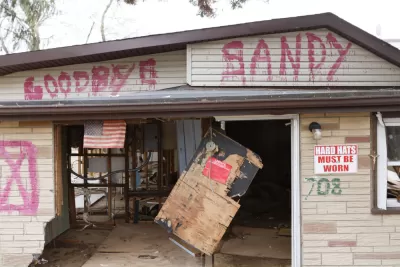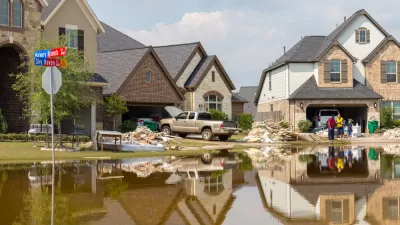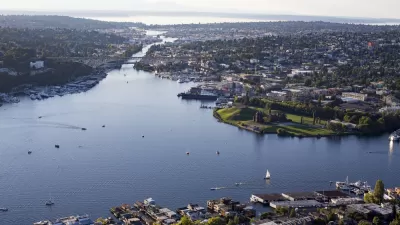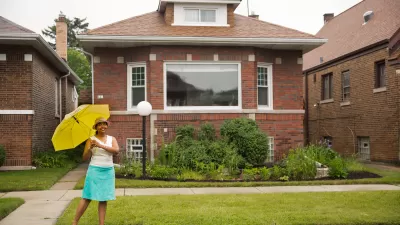The largest privately funded climate-adaptation program in the United States, 100 Resilient Cities, will conclude in July.

Late last week, reports that the Rockefeller Foundation would end its groundbreaking climate resilience program, 100 Resilient Cities, caught the climate change advocacy community by surprise.
Christopher Flavelle wrote on March 28 to break the news of the program's impending doom, also explaining how the 100 Resilient Cities program works and where in the United States funding had been allocated "to hire 'chief resilience officers'" and grant "access to the organization’s staff and external consultants, as well as to a global network of cities trying to grapple with similar problems."
Twenty-four large and medium U.S. cities use the program, among them some of those most exposed to hurricanes and rising seas, including New Orleans, Houston, Seattle and Norfolk, Virginia. But the initiative also drew in cities far from the coast, such as Tulsa, Oklahoma; Louisville, Kentucky; Pittsburgh and St. Louis -- places contending with other types of extreme weather, like flooding and heat waves.
The initiative’s approach is to define resilience broadly, in a way that incorporates the social and economic challenges likely to amplify the physical shocks of natural disasters. That approach matches the overlapping risks associated with climate change.
Analysis by the Urban Institute, completed in 2018, found the program to be mostly effective.
In the process of breaking the news, Flavelle also speculated that the program's demise might be connected to leadership change at the Foundation.
Flavelle also published a follow up article confirming the news on April 1, 2019, adding additional details about the future of the Rockfeller Foundation's climate change work.
Rockefeller will shift some of its resilience funding to the Atlantic Council, a Washington-based think tank, with a $30 million grant to the council’s Adrienne Arsht Center for Resilience, the foundation said in a press release. Rockefeller also announced a $12 million grant “to allow continued support and transition time to the 100 Resilient Cities network through much of 2019.”
A Rockefeller Foundation spokesperson, Matt Herrick, is quoted in the article saying the 100 Resilient Cities program ended because it had achieved most of its goals.
A separate article by Eillie Anzilotti expands on the implications of the decision, describing the end of the program as a "blow" to the evolving field of sustainability and resilience.
FULL STORY: Rockefeller to Wind Down Biggest Private Climate Resilience Push

Study: Maui’s Plan to Convert Vacation Rentals to Long-Term Housing Could Cause Nearly $1 Billion Economic Loss
The plan would reduce visitor accommodation by 25,% resulting in 1,900 jobs lost.

North Texas Transit Leaders Tout Benefits of TOD for Growing Region
At a summit focused on transit-oriented development, policymakers discussed how North Texas’ expanded light rail system can serve as a tool for economic growth.

Using Old Oil and Gas Wells for Green Energy Storage
Penn State researchers have found that repurposing abandoned oil and gas wells for geothermal-assisted compressed-air energy storage can boost efficiency, reduce environmental risks, and support clean energy and job transitions.

Private Donations Propel Early Restoration of Palisades Playground
Los Angeles has secured over $1.3 million in private funding to restore the Pacific Palisades playground months ahead of schedule, creating a modern, accessible space that supports community healing after recent wildfires.

From Blight to Benefit: Early Results From California’s Equitable Cleanup Program
The Equitable Community Revitalization Grant (ECRG) program is reshaping brownfield redevelopment by prioritizing projects in low-income and environmental justice communities, emphasizing equity, transparency, and community benefits.

Planting Relief: Tackling Las Vegas Heat One Tree at a Time
Nevada Plants, a Las Vegas-based nonprofit, is combating the city’s extreme urban heat by giving away trees to residents in underserved neighborhoods, promoting shade, sustainability, and community health.
Urban Design for Planners 1: Software Tools
This six-course series explores essential urban design concepts using open source software and equips planners with the tools they need to participate fully in the urban design process.
Planning for Universal Design
Learn the tools for implementing Universal Design in planning regulations.
Ascent Environmental
Borough of Carlisle
Institute for Housing and Urban Development Studies (IHS)
City of Grandview
Harvard GSD Executive Education
Toledo-Lucas County Plan Commissions
Salt Lake City
NYU Wagner Graduate School of Public Service





























